Business Operations Report: TESCO - Economic Environment and HRM
VerifiedAdded on 2023/03/16
|11
|3020
|67
Report
AI Summary
This report provides a comprehensive analysis of TESCO's business operations, beginning with an introduction to internal and external factors influencing a company's performance. It explores the types of organizations in the UK's public and private sectors and examines different business structures. The report delves into the impact of the local and global economic environment on TESCO's operations, emphasizing the significance of accounting in business success, including evaluating performance and managing cash flow. It also covers the functions of the HR department, key features of employment legislation, and an accounting workshop with a profit and loss statement analysis. Furthermore, it analyzes team roles, motivational theories, leadership styles, and their impact on employees, along with the importance of customer service for business success.
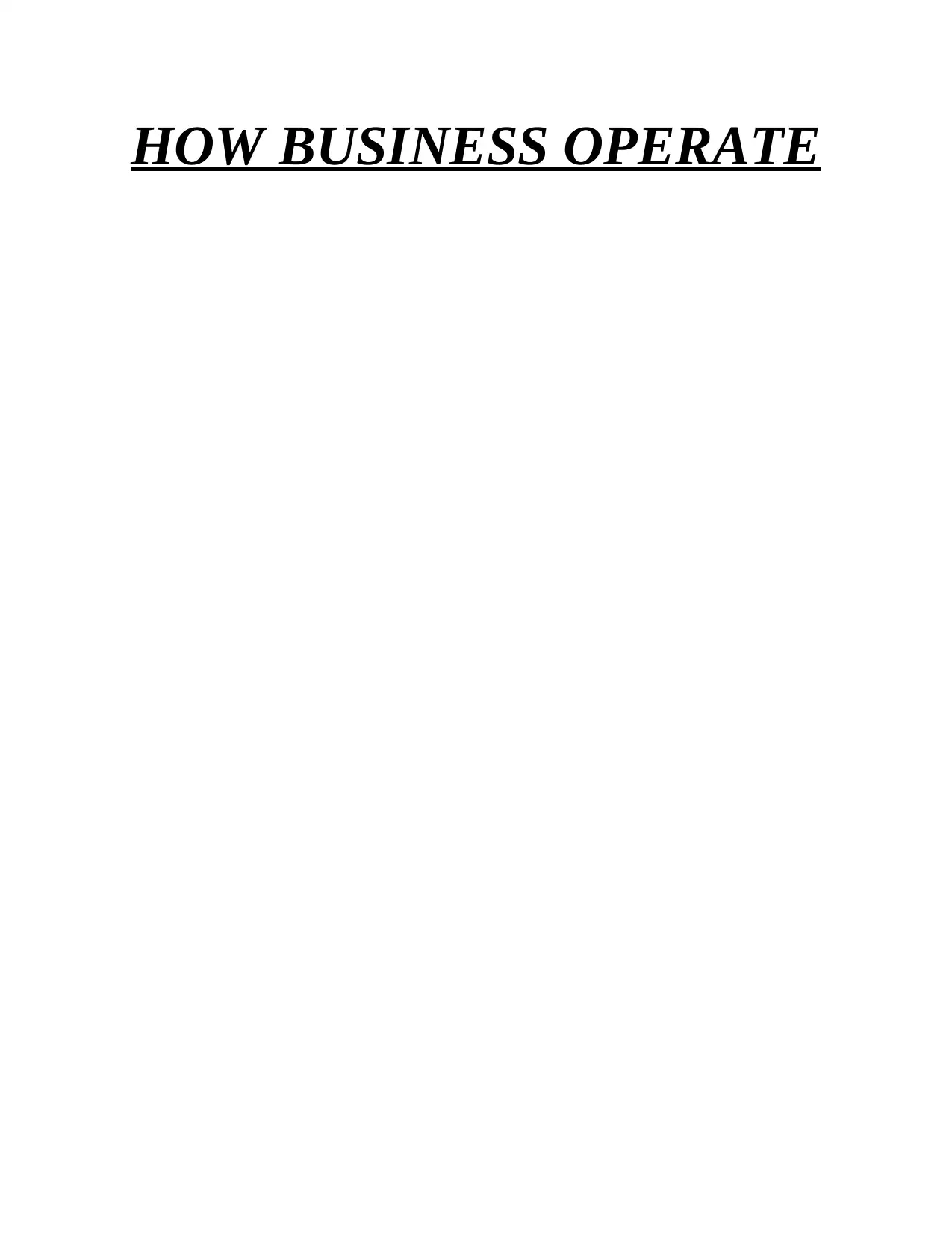
HOW BUSINESS OPERATE
Paraphrase This Document
Need a fresh take? Get an instant paraphrase of this document with our AI Paraphraser
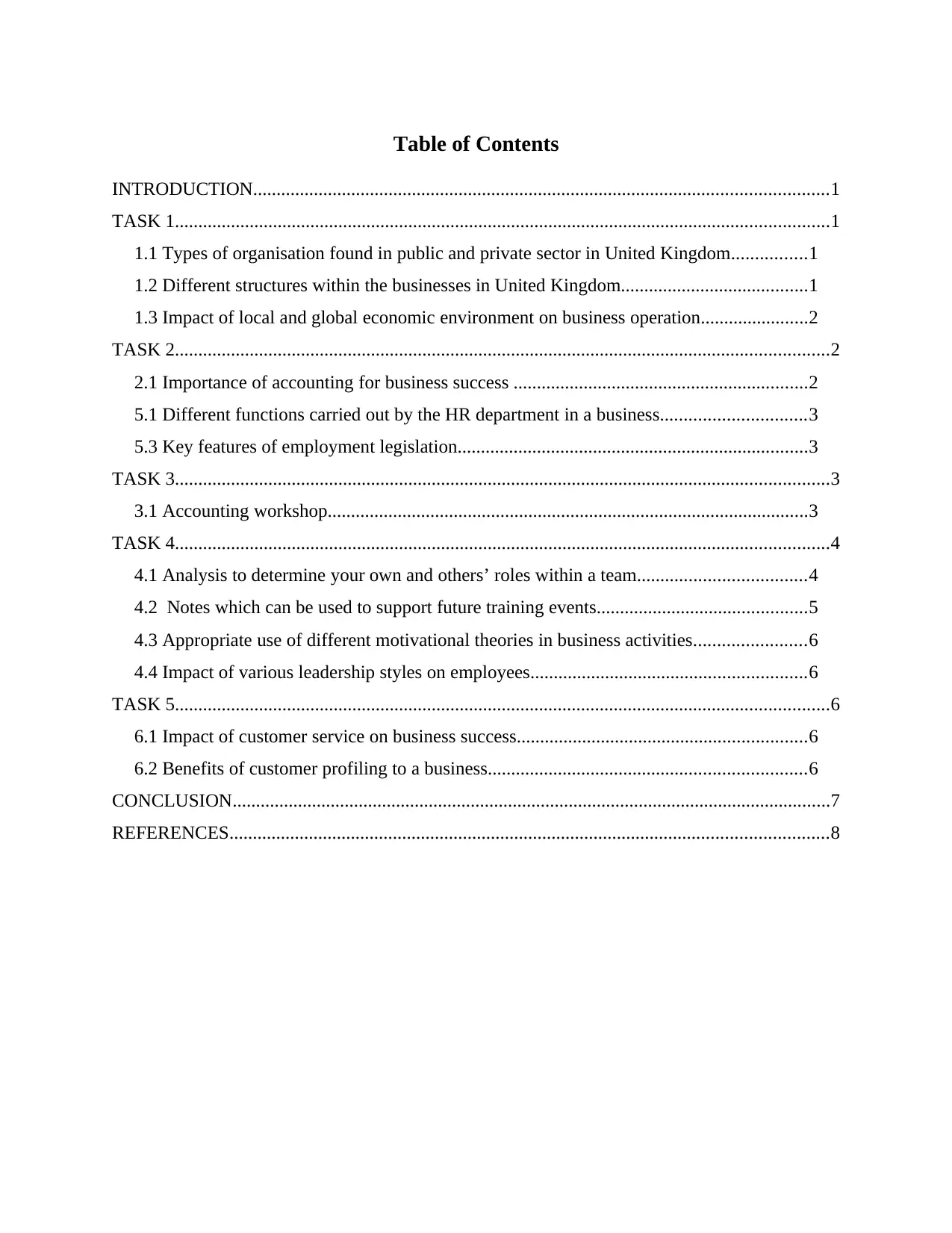
Table of Contents
INTRODUCTION...........................................................................................................................1
TASK 1............................................................................................................................................1
1.1 Types of organisation found in public and private sector in United Kingdom................1
1.2 Different structures within the businesses in United Kingdom........................................1
1.3 Impact of local and global economic environment on business operation.......................2
TASK 2............................................................................................................................................2
2.1 Importance of accounting for business success ...............................................................2
5.1 Different functions carried out by the HR department in a business...............................3
5.3 Key features of employment legislation...........................................................................3
TASK 3............................................................................................................................................3
3.1 Accounting workshop.......................................................................................................3
TASK 4............................................................................................................................................4
4.1 Analysis to determine your own and others’ roles within a team....................................4
4.2 Notes which can be used to support future training events.............................................5
4.3 Appropriate use of different motivational theories in business activities........................6
4.4 Impact of various leadership styles on employees...........................................................6
TASK 5............................................................................................................................................6
6.1 Impact of customer service on business success..............................................................6
6.2 Benefits of customer profiling to a business....................................................................6
CONCLUSION................................................................................................................................7
REFERENCES................................................................................................................................8
INTRODUCTION...........................................................................................................................1
TASK 1............................................................................................................................................1
1.1 Types of organisation found in public and private sector in United Kingdom................1
1.2 Different structures within the businesses in United Kingdom........................................1
1.3 Impact of local and global economic environment on business operation.......................2
TASK 2............................................................................................................................................2
2.1 Importance of accounting for business success ...............................................................2
5.1 Different functions carried out by the HR department in a business...............................3
5.3 Key features of employment legislation...........................................................................3
TASK 3............................................................................................................................................3
3.1 Accounting workshop.......................................................................................................3
TASK 4............................................................................................................................................4
4.1 Analysis to determine your own and others’ roles within a team....................................4
4.2 Notes which can be used to support future training events.............................................5
4.3 Appropriate use of different motivational theories in business activities........................6
4.4 Impact of various leadership styles on employees...........................................................6
TASK 5............................................................................................................................................6
6.1 Impact of customer service on business success..............................................................6
6.2 Benefits of customer profiling to a business....................................................................6
CONCLUSION................................................................................................................................7
REFERENCES................................................................................................................................8

⊘ This is a preview!⊘
Do you want full access?
Subscribe today to unlock all pages.

Trusted by 1+ million students worldwide
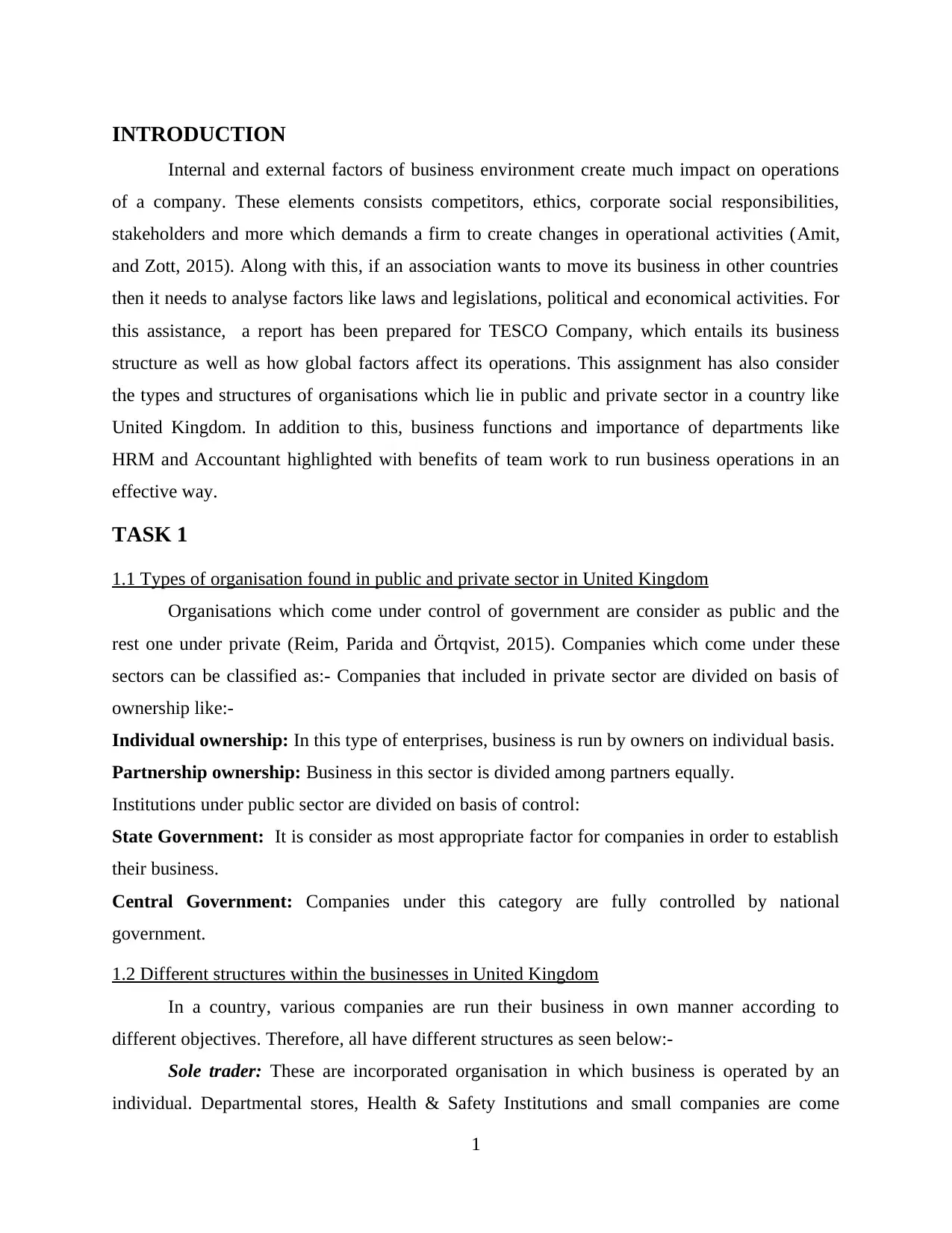
INTRODUCTION
Internal and external factors of business environment create much impact on operations
of a company. These elements consists competitors, ethics, corporate social responsibilities,
stakeholders and more which demands a firm to create changes in operational activities (Amit,
and Zott, 2015). Along with this, if an association wants to move its business in other countries
then it needs to analyse factors like laws and legislations, political and economical activities. For
this assistance, a report has been prepared for TESCO Company, which entails its business
structure as well as how global factors affect its operations. This assignment has also consider
the types and structures of organisations which lie in public and private sector in a country like
United Kingdom. In addition to this, business functions and importance of departments like
HRM and Accountant highlighted with benefits of team work to run business operations in an
effective way.
TASK 1
1.1 Types of organisation found in public and private sector in United Kingdom
Organisations which come under control of government are consider as public and the
rest one under private (Reim, Parida and Örtqvist, 2015). Companies which come under these
sectors can be classified as:- Companies that included in private sector are divided on basis of
ownership like:-
Individual ownership: In this type of enterprises, business is run by owners on individual basis.
Partnership ownership: Business in this sector is divided among partners equally.
Institutions under public sector are divided on basis of control:
State Government: It is consider as most appropriate factor for companies in order to establish
their business.
Central Government: Companies under this category are fully controlled by national
government.
1.2 Different structures within the businesses in United Kingdom
In a country, various companies are run their business in own manner according to
different objectives. Therefore, all have different structures as seen below:-
Sole trader: These are incorporated organisation in which business is operated by an
individual. Departmental stores, Health & Safety Institutions and small companies are come
1
Internal and external factors of business environment create much impact on operations
of a company. These elements consists competitors, ethics, corporate social responsibilities,
stakeholders and more which demands a firm to create changes in operational activities (Amit,
and Zott, 2015). Along with this, if an association wants to move its business in other countries
then it needs to analyse factors like laws and legislations, political and economical activities. For
this assistance, a report has been prepared for TESCO Company, which entails its business
structure as well as how global factors affect its operations. This assignment has also consider
the types and structures of organisations which lie in public and private sector in a country like
United Kingdom. In addition to this, business functions and importance of departments like
HRM and Accountant highlighted with benefits of team work to run business operations in an
effective way.
TASK 1
1.1 Types of organisation found in public and private sector in United Kingdom
Organisations which come under control of government are consider as public and the
rest one under private (Reim, Parida and Örtqvist, 2015). Companies which come under these
sectors can be classified as:- Companies that included in private sector are divided on basis of
ownership like:-
Individual ownership: In this type of enterprises, business is run by owners on individual basis.
Partnership ownership: Business in this sector is divided among partners equally.
Institutions under public sector are divided on basis of control:
State Government: It is consider as most appropriate factor for companies in order to establish
their business.
Central Government: Companies under this category are fully controlled by national
government.
1.2 Different structures within the businesses in United Kingdom
In a country, various companies are run their business in own manner according to
different objectives. Therefore, all have different structures as seen below:-
Sole trader: These are incorporated organisation in which business is operated by an
individual. Departmental stores, Health & Safety Institutions and small companies are come
1
Paraphrase This Document
Need a fresh take? Get an instant paraphrase of this document with our AI Paraphraser
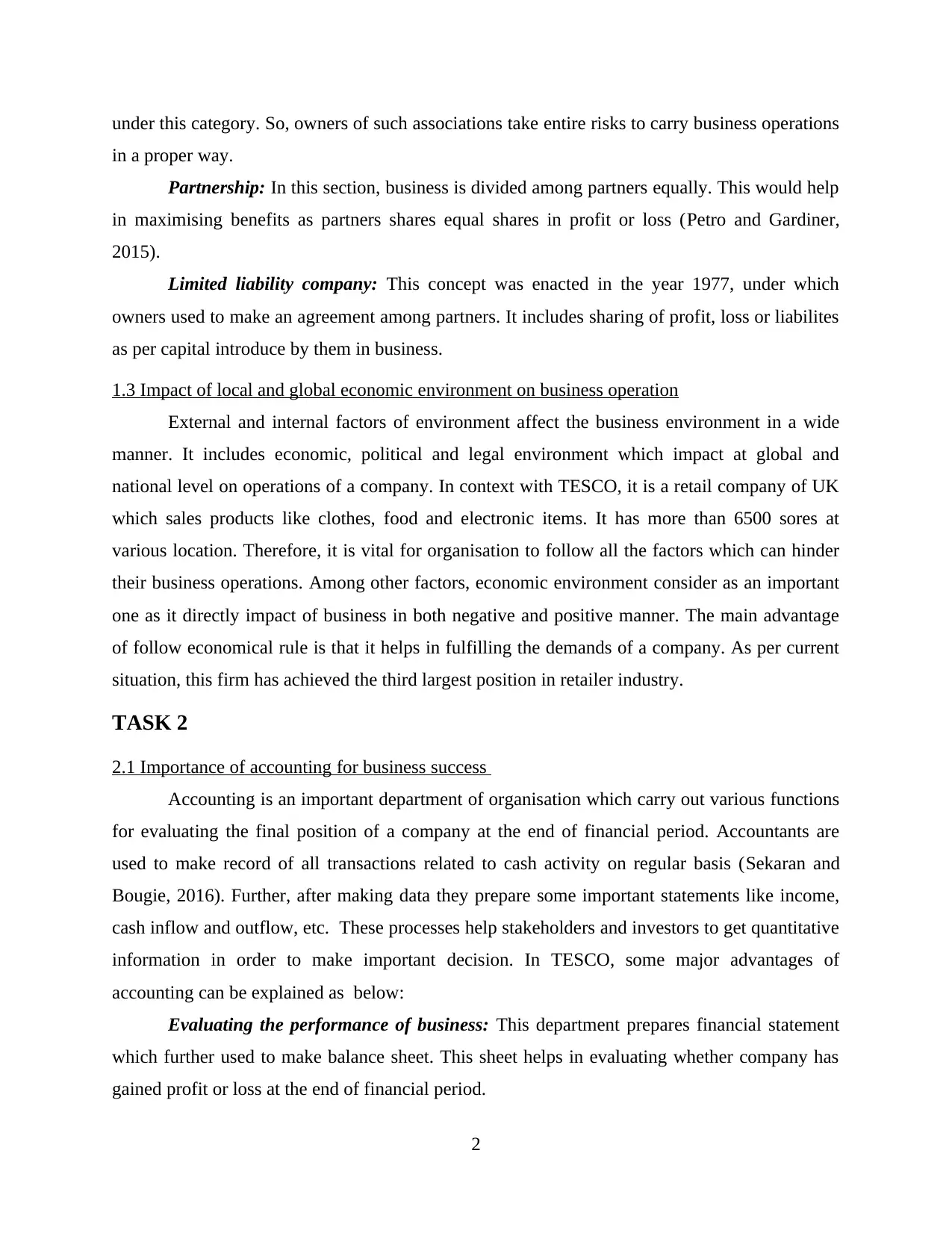
under this category. So, owners of such associations take entire risks to carry business operations
in a proper way.
Partnership: In this section, business is divided among partners equally. This would help
in maximising benefits as partners shares equal shares in profit or loss (Petro and Gardiner,
2015).
Limited liability company: This concept was enacted in the year 1977, under which
owners used to make an agreement among partners. It includes sharing of profit, loss or liabilites
as per capital introduce by them in business.
1.3 Impact of local and global economic environment on business operation
External and internal factors of environment affect the business environment in a wide
manner. It includes economic, political and legal environment which impact at global and
national level on operations of a company. In context with TESCO, it is a retail company of UK
which sales products like clothes, food and electronic items. It has more than 6500 sores at
various location. Therefore, it is vital for organisation to follow all the factors which can hinder
their business operations. Among other factors, economic environment consider as an important
one as it directly impact of business in both negative and positive manner. The main advantage
of follow economical rule is that it helps in fulfilling the demands of a company. As per current
situation, this firm has achieved the third largest position in retailer industry.
TASK 2
2.1 Importance of accounting for business success
Accounting is an important department of organisation which carry out various functions
for evaluating the final position of a company at the end of financial period. Accountants are
used to make record of all transactions related to cash activity on regular basis (Sekaran and
Bougie, 2016). Further, after making data they prepare some important statements like income,
cash inflow and outflow, etc. These processes help stakeholders and investors to get quantitative
information in order to make important decision. In TESCO, some major advantages of
accounting can be explained as below:
Evaluating the performance of business: This department prepares financial statement
which further used to make balance sheet. This sheet helps in evaluating whether company has
gained profit or loss at the end of financial period.
2
in a proper way.
Partnership: In this section, business is divided among partners equally. This would help
in maximising benefits as partners shares equal shares in profit or loss (Petro and Gardiner,
2015).
Limited liability company: This concept was enacted in the year 1977, under which
owners used to make an agreement among partners. It includes sharing of profit, loss or liabilites
as per capital introduce by them in business.
1.3 Impact of local and global economic environment on business operation
External and internal factors of environment affect the business environment in a wide
manner. It includes economic, political and legal environment which impact at global and
national level on operations of a company. In context with TESCO, it is a retail company of UK
which sales products like clothes, food and electronic items. It has more than 6500 sores at
various location. Therefore, it is vital for organisation to follow all the factors which can hinder
their business operations. Among other factors, economic environment consider as an important
one as it directly impact of business in both negative and positive manner. The main advantage
of follow economical rule is that it helps in fulfilling the demands of a company. As per current
situation, this firm has achieved the third largest position in retailer industry.
TASK 2
2.1 Importance of accounting for business success
Accounting is an important department of organisation which carry out various functions
for evaluating the final position of a company at the end of financial period. Accountants are
used to make record of all transactions related to cash activity on regular basis (Sekaran and
Bougie, 2016). Further, after making data they prepare some important statements like income,
cash inflow and outflow, etc. These processes help stakeholders and investors to get quantitative
information in order to make important decision. In TESCO, some major advantages of
accounting can be explained as below:
Evaluating the performance of business: This department prepares financial statement
which further used to make balance sheet. This sheet helps in evaluating whether company has
gained profit or loss at the end of financial period.
2
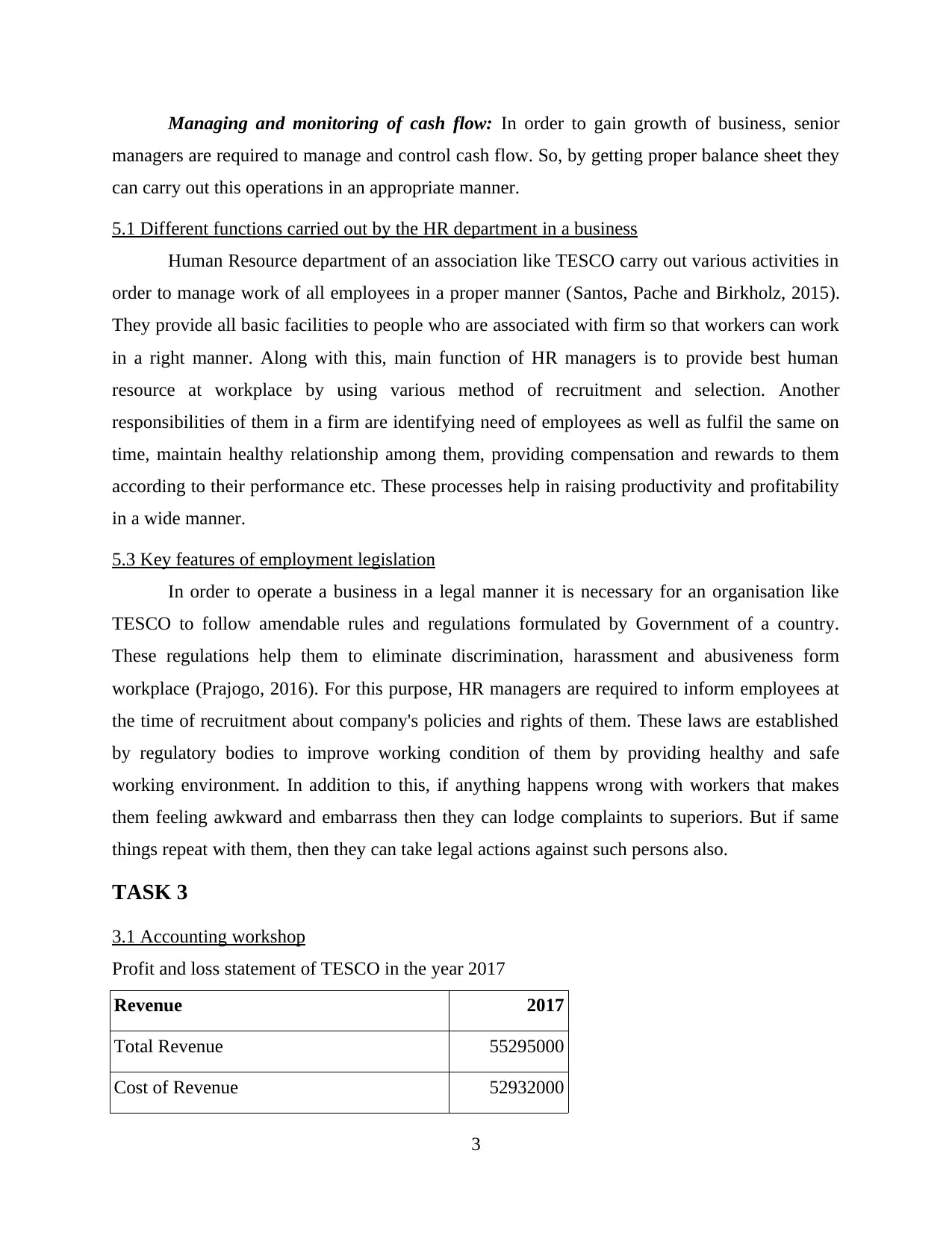
Managing and monitoring of cash flow: In order to gain growth of business, senior
managers are required to manage and control cash flow. So, by getting proper balance sheet they
can carry out this operations in an appropriate manner.
5.1 Different functions carried out by the HR department in a business
Human Resource department of an association like TESCO carry out various activities in
order to manage work of all employees in a proper manner (Santos, Pache and Birkholz, 2015).
They provide all basic facilities to people who are associated with firm so that workers can work
in a right manner. Along with this, main function of HR managers is to provide best human
resource at workplace by using various method of recruitment and selection. Another
responsibilities of them in a firm are identifying need of employees as well as fulfil the same on
time, maintain healthy relationship among them, providing compensation and rewards to them
according to their performance etc. These processes help in raising productivity and profitability
in a wide manner.
5.3 Key features of employment legislation
In order to operate a business in a legal manner it is necessary for an organisation like
TESCO to follow amendable rules and regulations formulated by Government of a country.
These regulations help them to eliminate discrimination, harassment and abusiveness form
workplace (Prajogo, 2016). For this purpose, HR managers are required to inform employees at
the time of recruitment about company's policies and rights of them. These laws are established
by regulatory bodies to improve working condition of them by providing healthy and safe
working environment. In addition to this, if anything happens wrong with workers that makes
them feeling awkward and embarrass then they can lodge complaints to superiors. But if same
things repeat with them, then they can take legal actions against such persons also.
TASK 3
3.1 Accounting workshop
Profit and loss statement of TESCO in the year 2017
Revenue 2017
Total Revenue 55295000
Cost of Revenue 52932000
3
managers are required to manage and control cash flow. So, by getting proper balance sheet they
can carry out this operations in an appropriate manner.
5.1 Different functions carried out by the HR department in a business
Human Resource department of an association like TESCO carry out various activities in
order to manage work of all employees in a proper manner (Santos, Pache and Birkholz, 2015).
They provide all basic facilities to people who are associated with firm so that workers can work
in a right manner. Along with this, main function of HR managers is to provide best human
resource at workplace by using various method of recruitment and selection. Another
responsibilities of them in a firm are identifying need of employees as well as fulfil the same on
time, maintain healthy relationship among them, providing compensation and rewards to them
according to their performance etc. These processes help in raising productivity and profitability
in a wide manner.
5.3 Key features of employment legislation
In order to operate a business in a legal manner it is necessary for an organisation like
TESCO to follow amendable rules and regulations formulated by Government of a country.
These regulations help them to eliminate discrimination, harassment and abusiveness form
workplace (Prajogo, 2016). For this purpose, HR managers are required to inform employees at
the time of recruitment about company's policies and rights of them. These laws are established
by regulatory bodies to improve working condition of them by providing healthy and safe
working environment. In addition to this, if anything happens wrong with workers that makes
them feeling awkward and embarrass then they can lodge complaints to superiors. But if same
things repeat with them, then they can take legal actions against such persons also.
TASK 3
3.1 Accounting workshop
Profit and loss statement of TESCO in the year 2017
Revenue 2017
Total Revenue 55295000
Cost of Revenue 52932000
3
⊘ This is a preview!⊘
Do you want full access?
Subscribe today to unlock all pages.

Trusted by 1+ million students worldwide
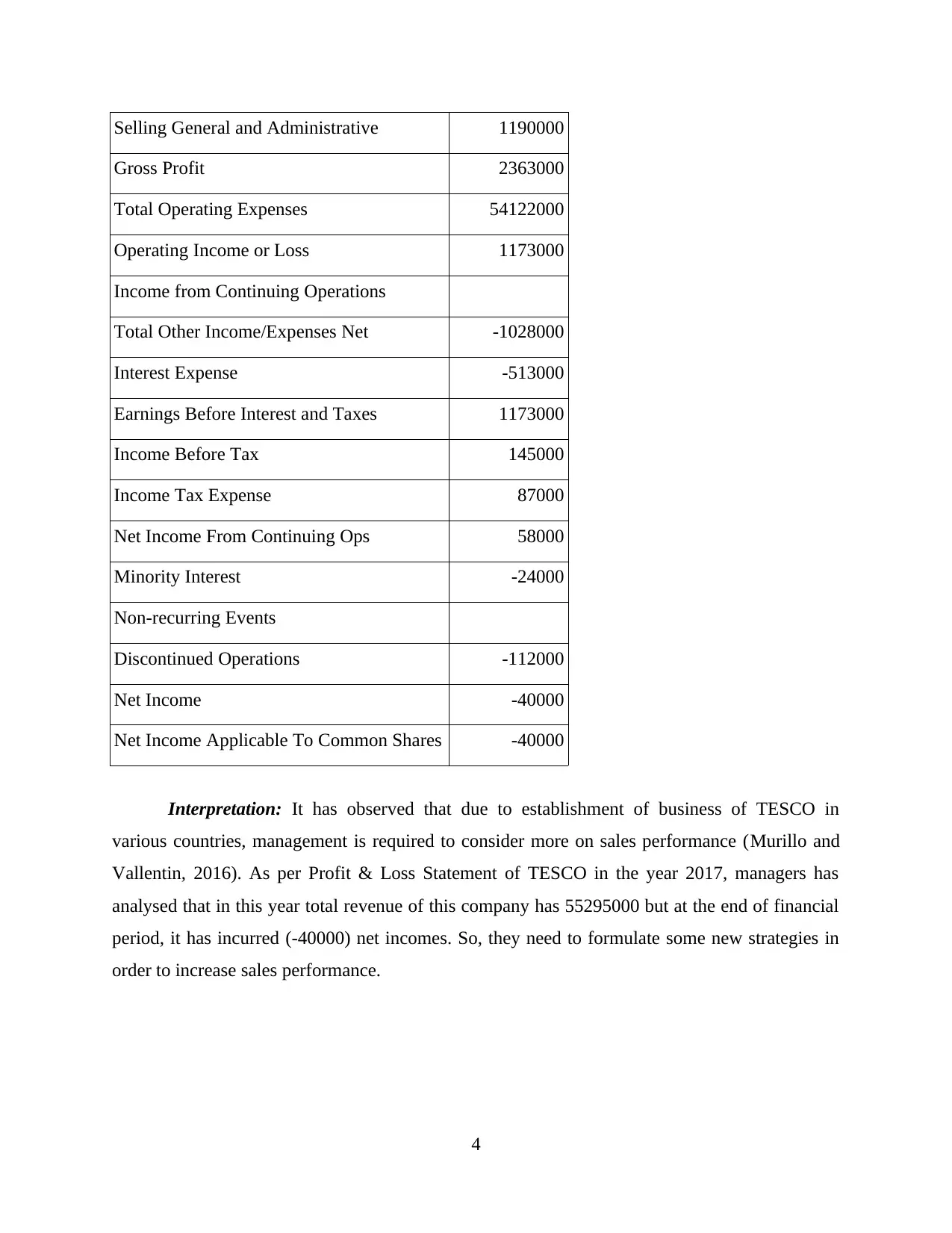
Selling General and Administrative 1190000
Gross Profit 2363000
Total Operating Expenses 54122000
Operating Income or Loss 1173000
Income from Continuing Operations
Total Other Income/Expenses Net -1028000
Interest Expense -513000
Earnings Before Interest and Taxes 1173000
Income Before Tax 145000
Income Tax Expense 87000
Net Income From Continuing Ops 58000
Minority Interest -24000
Non-recurring Events
Discontinued Operations -112000
Net Income -40000
Net Income Applicable To Common Shares -40000
Interpretation: It has observed that due to establishment of business of TESCO in
various countries, management is required to consider more on sales performance (Murillo and
Vallentin, 2016). As per Profit & Loss Statement of TESCO in the year 2017, managers has
analysed that in this year total revenue of this company has 55295000 but at the end of financial
period, it has incurred (-40000) net incomes. So, they need to formulate some new strategies in
order to increase sales performance.
4
Gross Profit 2363000
Total Operating Expenses 54122000
Operating Income or Loss 1173000
Income from Continuing Operations
Total Other Income/Expenses Net -1028000
Interest Expense -513000
Earnings Before Interest and Taxes 1173000
Income Before Tax 145000
Income Tax Expense 87000
Net Income From Continuing Ops 58000
Minority Interest -24000
Non-recurring Events
Discontinued Operations -112000
Net Income -40000
Net Income Applicable To Common Shares -40000
Interpretation: It has observed that due to establishment of business of TESCO in
various countries, management is required to consider more on sales performance (Murillo and
Vallentin, 2016). As per Profit & Loss Statement of TESCO in the year 2017, managers has
analysed that in this year total revenue of this company has 55295000 but at the end of financial
period, it has incurred (-40000) net incomes. So, they need to formulate some new strategies in
order to increase sales performance.
4
Paraphrase This Document
Need a fresh take? Get an instant paraphrase of this document with our AI Paraphraser
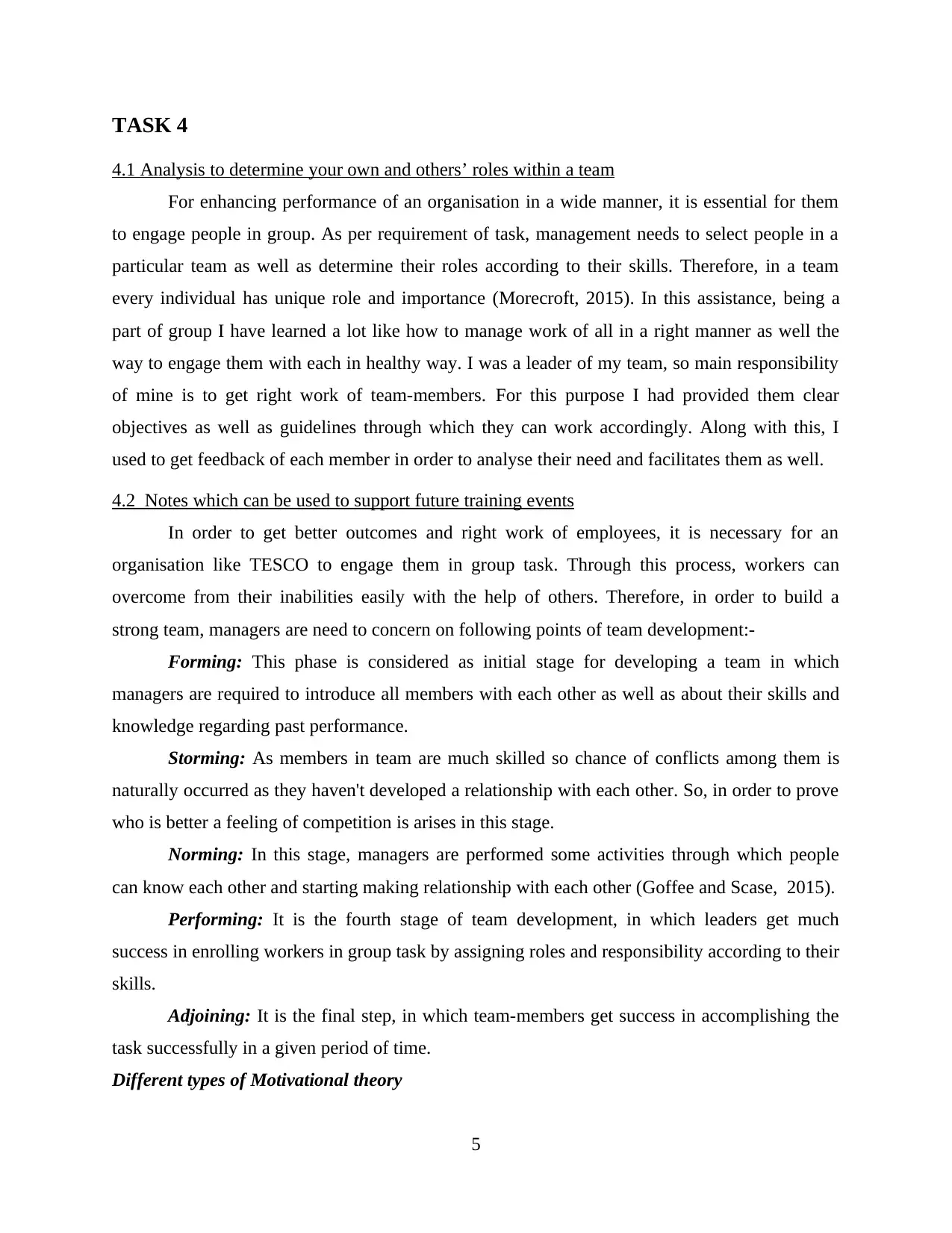
TASK 4
4.1 Analysis to determine your own and others’ roles within a team
For enhancing performance of an organisation in a wide manner, it is essential for them
to engage people in group. As per requirement of task, management needs to select people in a
particular team as well as determine their roles according to their skills. Therefore, in a team
every individual has unique role and importance (Morecroft, 2015). In this assistance, being a
part of group I have learned a lot like how to manage work of all in a right manner as well the
way to engage them with each in healthy way. I was a leader of my team, so main responsibility
of mine is to get right work of team-members. For this purpose I had provided them clear
objectives as well as guidelines through which they can work accordingly. Along with this, I
used to get feedback of each member in order to analyse their need and facilitates them as well.
4.2 Notes which can be used to support future training events
In order to get better outcomes and right work of employees, it is necessary for an
organisation like TESCO to engage them in group task. Through this process, workers can
overcome from their inabilities easily with the help of others. Therefore, in order to build a
strong team, managers are need to concern on following points of team development:-
Forming: This phase is considered as initial stage for developing a team in which
managers are required to introduce all members with each other as well as about their skills and
knowledge regarding past performance.
Storming: As members in team are much skilled so chance of conflicts among them is
naturally occurred as they haven't developed a relationship with each other. So, in order to prove
who is better a feeling of competition is arises in this stage.
Norming: In this stage, managers are performed some activities through which people
can know each other and starting making relationship with each other (Goffee and Scase, 2015).
Performing: It is the fourth stage of team development, in which leaders get much
success in enrolling workers in group task by assigning roles and responsibility according to their
skills.
Adjoining: It is the final step, in which team-members get success in accomplishing the
task successfully in a given period of time.
Different types of Motivational theory
5
4.1 Analysis to determine your own and others’ roles within a team
For enhancing performance of an organisation in a wide manner, it is essential for them
to engage people in group. As per requirement of task, management needs to select people in a
particular team as well as determine their roles according to their skills. Therefore, in a team
every individual has unique role and importance (Morecroft, 2015). In this assistance, being a
part of group I have learned a lot like how to manage work of all in a right manner as well the
way to engage them with each in healthy way. I was a leader of my team, so main responsibility
of mine is to get right work of team-members. For this purpose I had provided them clear
objectives as well as guidelines through which they can work accordingly. Along with this, I
used to get feedback of each member in order to analyse their need and facilitates them as well.
4.2 Notes which can be used to support future training events
In order to get better outcomes and right work of employees, it is necessary for an
organisation like TESCO to engage them in group task. Through this process, workers can
overcome from their inabilities easily with the help of others. Therefore, in order to build a
strong team, managers are need to concern on following points of team development:-
Forming: This phase is considered as initial stage for developing a team in which
managers are required to introduce all members with each other as well as about their skills and
knowledge regarding past performance.
Storming: As members in team are much skilled so chance of conflicts among them is
naturally occurred as they haven't developed a relationship with each other. So, in order to prove
who is better a feeling of competition is arises in this stage.
Norming: In this stage, managers are performed some activities through which people
can know each other and starting making relationship with each other (Goffee and Scase, 2015).
Performing: It is the fourth stage of team development, in which leaders get much
success in enrolling workers in group task by assigning roles and responsibility according to their
skills.
Adjoining: It is the final step, in which team-members get success in accomplishing the
task successfully in a given period of time.
Different types of Motivational theory
5
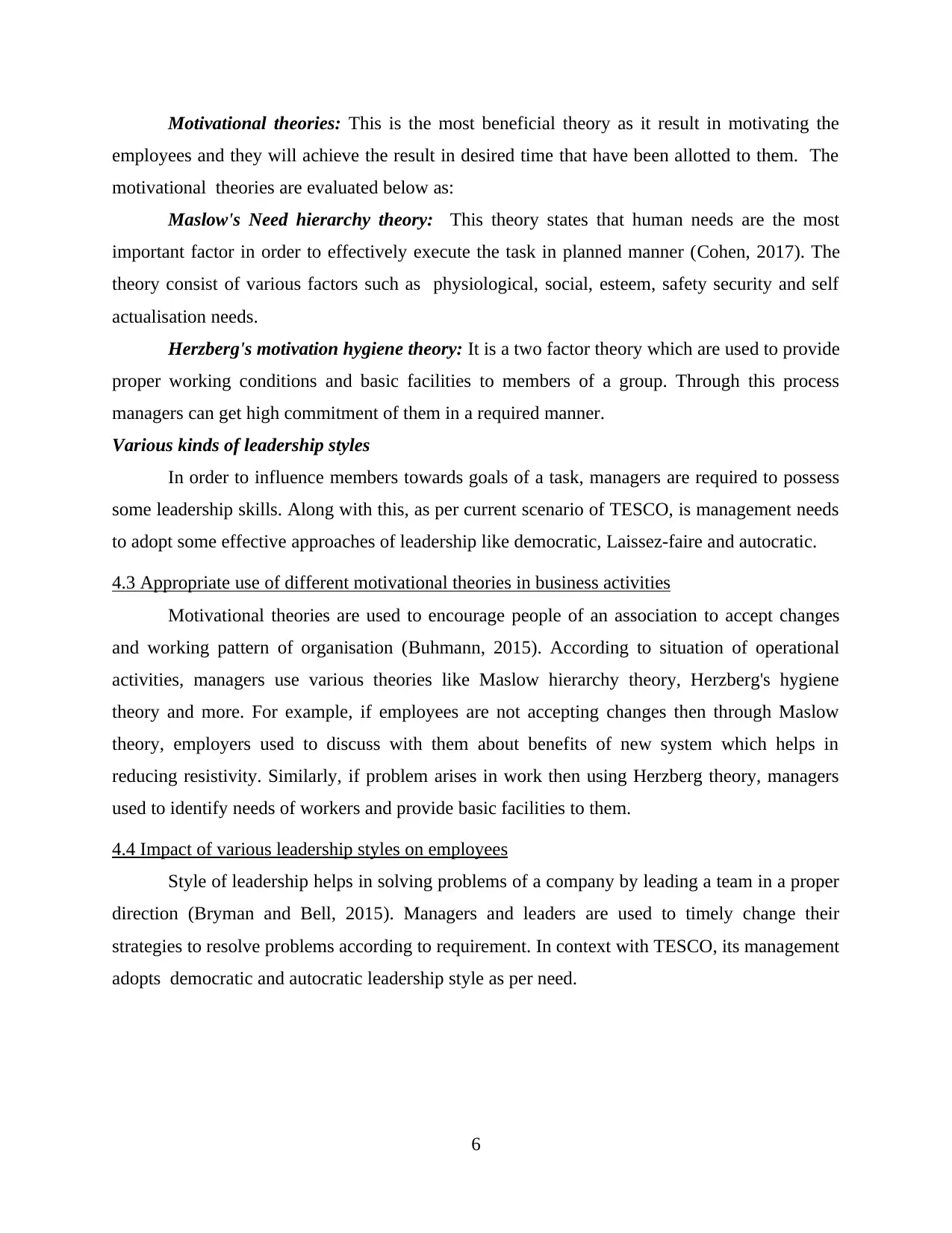
Motivational theories: This is the most beneficial theory as it result in motivating the
employees and they will achieve the result in desired time that have been allotted to them. The
motivational theories are evaluated below as:
Maslow's Need hierarchy theory: This theory states that human needs are the most
important factor in order to effectively execute the task in planned manner (Cohen, 2017). The
theory consist of various factors such as physiological, social, esteem, safety security and self
actualisation needs.
Herzberg's motivation hygiene theory: It is a two factor theory which are used to provide
proper working conditions and basic facilities to members of a group. Through this process
managers can get high commitment of them in a required manner.
Various kinds of leadership styles
In order to influence members towards goals of a task, managers are required to possess
some leadership skills. Along with this, as per current scenario of TESCO, is management needs
to adopt some effective approaches of leadership like democratic, Laissez-faire and autocratic.
4.3 Appropriate use of different motivational theories in business activities
Motivational theories are used to encourage people of an association to accept changes
and working pattern of organisation (Buhmann, 2015). According to situation of operational
activities, managers use various theories like Maslow hierarchy theory, Herzberg's hygiene
theory and more. For example, if employees are not accepting changes then through Maslow
theory, employers used to discuss with them about benefits of new system which helps in
reducing resistivity. Similarly, if problem arises in work then using Herzberg theory, managers
used to identify needs of workers and provide basic facilities to them.
4.4 Impact of various leadership styles on employees
Style of leadership helps in solving problems of a company by leading a team in a proper
direction (Bryman and Bell, 2015). Managers and leaders are used to timely change their
strategies to resolve problems according to requirement. In context with TESCO, its management
adopts democratic and autocratic leadership style as per need.
6
employees and they will achieve the result in desired time that have been allotted to them. The
motivational theories are evaluated below as:
Maslow's Need hierarchy theory: This theory states that human needs are the most
important factor in order to effectively execute the task in planned manner (Cohen, 2017). The
theory consist of various factors such as physiological, social, esteem, safety security and self
actualisation needs.
Herzberg's motivation hygiene theory: It is a two factor theory which are used to provide
proper working conditions and basic facilities to members of a group. Through this process
managers can get high commitment of them in a required manner.
Various kinds of leadership styles
In order to influence members towards goals of a task, managers are required to possess
some leadership skills. Along with this, as per current scenario of TESCO, is management needs
to adopt some effective approaches of leadership like democratic, Laissez-faire and autocratic.
4.3 Appropriate use of different motivational theories in business activities
Motivational theories are used to encourage people of an association to accept changes
and working pattern of organisation (Buhmann, 2015). According to situation of operational
activities, managers use various theories like Maslow hierarchy theory, Herzberg's hygiene
theory and more. For example, if employees are not accepting changes then through Maslow
theory, employers used to discuss with them about benefits of new system which helps in
reducing resistivity. Similarly, if problem arises in work then using Herzberg theory, managers
used to identify needs of workers and provide basic facilities to them.
4.4 Impact of various leadership styles on employees
Style of leadership helps in solving problems of a company by leading a team in a proper
direction (Bryman and Bell, 2015). Managers and leaders are used to timely change their
strategies to resolve problems according to requirement. In context with TESCO, its management
adopts democratic and autocratic leadership style as per need.
6
⊘ This is a preview!⊘
Do you want full access?
Subscribe today to unlock all pages.

Trusted by 1+ million students worldwide
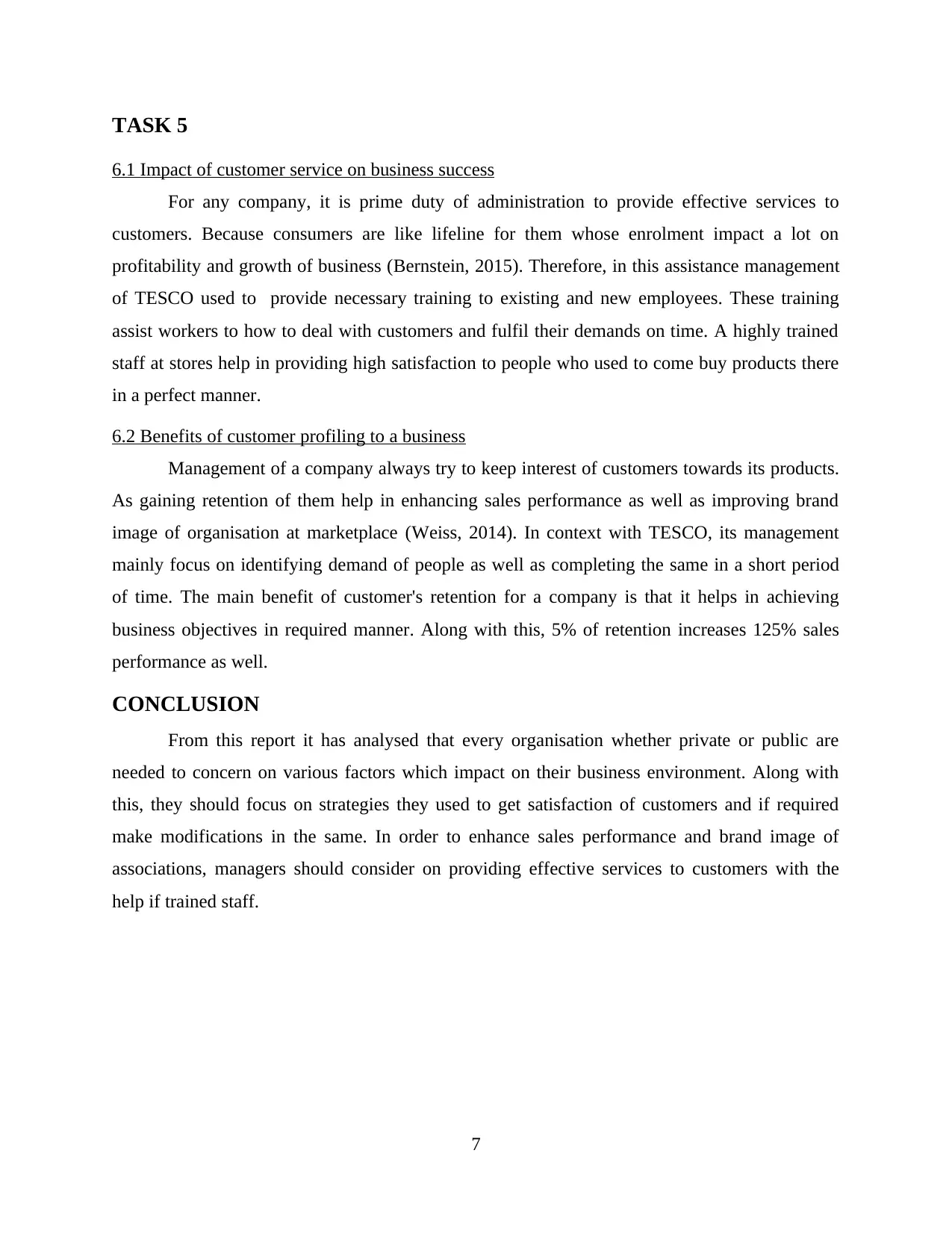
TASK 5
6.1 Impact of customer service on business success
For any company, it is prime duty of administration to provide effective services to
customers. Because consumers are like lifeline for them whose enrolment impact a lot on
profitability and growth of business (Bernstein, 2015). Therefore, in this assistance management
of TESCO used to provide necessary training to existing and new employees. These training
assist workers to how to deal with customers and fulfil their demands on time. A highly trained
staff at stores help in providing high satisfaction to people who used to come buy products there
in a perfect manner.
6.2 Benefits of customer profiling to a business
Management of a company always try to keep interest of customers towards its products.
As gaining retention of them help in enhancing sales performance as well as improving brand
image of organisation at marketplace (Weiss, 2014). In context with TESCO, its management
mainly focus on identifying demand of people as well as completing the same in a short period
of time. The main benefit of customer's retention for a company is that it helps in achieving
business objectives in required manner. Along with this, 5% of retention increases 125% sales
performance as well.
CONCLUSION
From this report it has analysed that every organisation whether private or public are
needed to concern on various factors which impact on their business environment. Along with
this, they should focus on strategies they used to get satisfaction of customers and if required
make modifications in the same. In order to enhance sales performance and brand image of
associations, managers should consider on providing effective services to customers with the
help if trained staff.
7
6.1 Impact of customer service on business success
For any company, it is prime duty of administration to provide effective services to
customers. Because consumers are like lifeline for them whose enrolment impact a lot on
profitability and growth of business (Bernstein, 2015). Therefore, in this assistance management
of TESCO used to provide necessary training to existing and new employees. These training
assist workers to how to deal with customers and fulfil their demands on time. A highly trained
staff at stores help in providing high satisfaction to people who used to come buy products there
in a perfect manner.
6.2 Benefits of customer profiling to a business
Management of a company always try to keep interest of customers towards its products.
As gaining retention of them help in enhancing sales performance as well as improving brand
image of organisation at marketplace (Weiss, 2014). In context with TESCO, its management
mainly focus on identifying demand of people as well as completing the same in a short period
of time. The main benefit of customer's retention for a company is that it helps in achieving
business objectives in required manner. Along with this, 5% of retention increases 125% sales
performance as well.
CONCLUSION
From this report it has analysed that every organisation whether private or public are
needed to concern on various factors which impact on their business environment. Along with
this, they should focus on strategies they used to get satisfaction of customers and if required
make modifications in the same. In order to enhance sales performance and brand image of
associations, managers should consider on providing effective services to customers with the
help if trained staff.
7
Paraphrase This Document
Need a fresh take? Get an instant paraphrase of this document with our AI Paraphraser
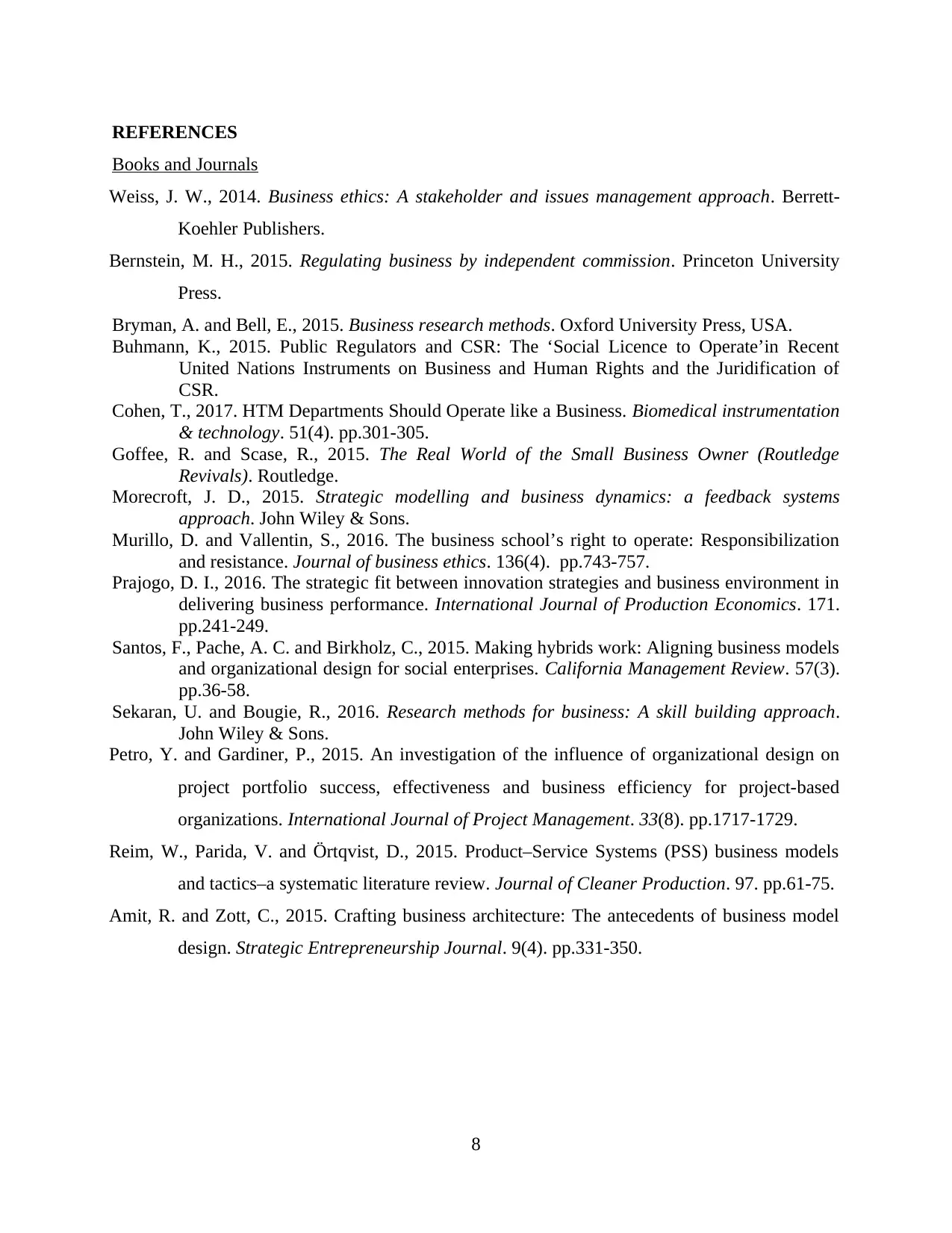
REFERENCES
Books and Journals
Weiss, J. W., 2014. Business ethics: A stakeholder and issues management approach. Berrett-
Koehler Publishers.
Bernstein, M. H., 2015. Regulating business by independent commission. Princeton University
Press.
Bryman, A. and Bell, E., 2015. Business research methods. Oxford University Press, USA.
Buhmann, K., 2015. Public Regulators and CSR: The ‘Social Licence to Operate’in Recent
United Nations Instruments on Business and Human Rights and the Juridification of
CSR.
Cohen, T., 2017. HTM Departments Should Operate like a Business. Biomedical instrumentation
& technology. 51(4). pp.301-305.
Goffee, R. and Scase, R., 2015. The Real World of the Small Business Owner (Routledge
Revivals). Routledge.
Morecroft, J. D., 2015. Strategic modelling and business dynamics: a feedback systems
approach. John Wiley & Sons.
Murillo, D. and Vallentin, S., 2016. The business school’s right to operate: Responsibilization
and resistance. Journal of business ethics. 136(4). pp.743-757.
Prajogo, D. I., 2016. The strategic fit between innovation strategies and business environment in
delivering business performance. International Journal of Production Economics. 171.
pp.241-249.
Santos, F., Pache, A. C. and Birkholz, C., 2015. Making hybrids work: Aligning business models
and organizational design for social enterprises. California Management Review. 57(3).
pp.36-58.
Sekaran, U. and Bougie, R., 2016. Research methods for business: A skill building approach.
John Wiley & Sons.
Petro, Y. and Gardiner, P., 2015. An investigation of the influence of organizational design on
project portfolio success, effectiveness and business efficiency for project-based
organizations. International Journal of Project Management. 33(8). pp.1717-1729.
Reim, W., Parida, V. and Örtqvist, D., 2015. Product–Service Systems (PSS) business models
and tactics–a systematic literature review. Journal of Cleaner Production. 97. pp.61-75.
Amit, R. and Zott, C., 2015. Crafting business architecture: The antecedents of business model
design. Strategic Entrepreneurship Journal. 9(4). pp.331-350.
8
Books and Journals
Weiss, J. W., 2014. Business ethics: A stakeholder and issues management approach. Berrett-
Koehler Publishers.
Bernstein, M. H., 2015. Regulating business by independent commission. Princeton University
Press.
Bryman, A. and Bell, E., 2015. Business research methods. Oxford University Press, USA.
Buhmann, K., 2015. Public Regulators and CSR: The ‘Social Licence to Operate’in Recent
United Nations Instruments on Business and Human Rights and the Juridification of
CSR.
Cohen, T., 2017. HTM Departments Should Operate like a Business. Biomedical instrumentation
& technology. 51(4). pp.301-305.
Goffee, R. and Scase, R., 2015. The Real World of the Small Business Owner (Routledge
Revivals). Routledge.
Morecroft, J. D., 2015. Strategic modelling and business dynamics: a feedback systems
approach. John Wiley & Sons.
Murillo, D. and Vallentin, S., 2016. The business school’s right to operate: Responsibilization
and resistance. Journal of business ethics. 136(4). pp.743-757.
Prajogo, D. I., 2016. The strategic fit between innovation strategies and business environment in
delivering business performance. International Journal of Production Economics. 171.
pp.241-249.
Santos, F., Pache, A. C. and Birkholz, C., 2015. Making hybrids work: Aligning business models
and organizational design for social enterprises. California Management Review. 57(3).
pp.36-58.
Sekaran, U. and Bougie, R., 2016. Research methods for business: A skill building approach.
John Wiley & Sons.
Petro, Y. and Gardiner, P., 2015. An investigation of the influence of organizational design on
project portfolio success, effectiveness and business efficiency for project-based
organizations. International Journal of Project Management. 33(8). pp.1717-1729.
Reim, W., Parida, V. and Örtqvist, D., 2015. Product–Service Systems (PSS) business models
and tactics–a systematic literature review. Journal of Cleaner Production. 97. pp.61-75.
Amit, R. and Zott, C., 2015. Crafting business architecture: The antecedents of business model
design. Strategic Entrepreneurship Journal. 9(4). pp.331-350.
8
1 out of 11
Related Documents
Your All-in-One AI-Powered Toolkit for Academic Success.
+13062052269
info@desklib.com
Available 24*7 on WhatsApp / Email
![[object Object]](/_next/static/media/star-bottom.7253800d.svg)
Unlock your academic potential
Copyright © 2020–2026 A2Z Services. All Rights Reserved. Developed and managed by ZUCOL.




